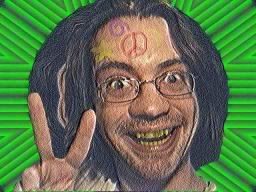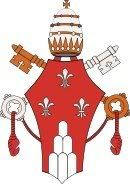A summary of the past 6 posts would go something like this: The shallow selfishness of consumerism and the myth of overpopulation has led to an irrational fear of human propagation, and to a widespread acceptance of artificial contraception. The acceptance of contraception has in turn led to an ideological divorce between sex and procreation. This divorce then leads inevitably to the acceptance and even approval of abortion, fornication, adultery, pornography, and homosexual practice. It's quite logical: If sex is primarily about the father-mother-child thing, the family thing, then traditional mores make lots of sense. But if it's just intimate pleasure between two partners, these various aberrations are no big deal.
There seems to be one more piece to this puzzle, another fundamental cause for the widespread acceptance of contraception and of all that follows. That piece would be a crisis of authority and of obedience to authority. In fact, if our culture manages to survive into the future, I believe future historians will name the crisis of authority as one of the defining elements of our time.
 I was a teenager in 1968 when post-Vatican II changes were sweeping through the Catholic Church. Those were the heady days of great social upheaval; of hippies, free love, and the questioning of authority. Some priests of my acquaintance - hip and relevant and groovy - were confident, and assured us lay folks, that the Church would soon get with it and relax most or all of her sexual hangups. When Pope Paul VI issued Humanae Vitae, and it wasn't what we were expecting, and did not seem relevant (true prophecies are rarely recognized at first), the cold reception it received was to be expected, given the milieu. Yet this was unprecedented, and has proven to be tragic.
I was a teenager in 1968 when post-Vatican II changes were sweeping through the Catholic Church. Those were the heady days of great social upheaval; of hippies, free love, and the questioning of authority. Some priests of my acquaintance - hip and relevant and groovy - were confident, and assured us lay folks, that the Church would soon get with it and relax most or all of her sexual hangups. When Pope Paul VI issued Humanae Vitae, and it wasn't what we were expecting, and did not seem relevant (true prophecies are rarely recognized at first), the cold reception it received was to be expected, given the milieu. Yet this was unprecedented, and has proven to be tragic.
Many priests and a few bishops openly repudiated both the new encyclical and the Church's long-standing condemnation of contraception. Other priests and bishops were simply silent, neither openly rejecting nor openly applauding the Pope's teaching. Only a few were vocal in their support. I have no credentials as an historian to say this was absolutely unprecedented, but can report that, even as a progressive-minded young man, I was surprised at this change of posture. For a reigning Pontiff to be thus ignored and even rebuffed was something I had never heard of.
This crisis extends beyond the Catholic Church. Lines of authority within the family are now typically pooh-poohed as well. Patriarchy is summarily dismissed as outmoded and irrelevant, and the father's authority in the home is questioned along with the bishop's and Pope's in the Church. I suppose this revolution took many decades, but the late 1960's have seemed to be the watershed moment.
But notice where authority is still esteemed - in the military, and in our places of business. Occasional exceptions aside, the chain of command in these settings is still clearly defined and adhered to.
 The corporate equivalent of a Fr. Richard McBrien would be quickly shown to the door. Perhaps the difference is: We need our businesses and our military to succeed; failure is unacceptable. But the health and success of the Church, or the family? (yawn) Who cares?
The corporate equivalent of a Fr. Richard McBrien would be quickly shown to the door. Perhaps the difference is: We need our businesses and our military to succeed; failure is unacceptable. But the health and success of the Church, or the family? (yawn) Who cares?
In 20-20 hindsight, it should now be obvious that Pope Paul VI was right. The dissidents were wrong then, and are wrong still. Even more fundamentally, rebellion against legitimate authority is both immature and arrogant. Rebellion against divinely ordained authority within the Church and the family is sinful, and is tantamount to rebellion against God. The 60's mentality - question traditional morality, question the status quo, question authority - seemed cool and relevant at the time, but has turned out to be merely stupid and selfish and short-sighted. Question one more thing, all you old hippies - question the questions!
 I would like to commend those few Catholic parishes in which yesterday's 2nd reading was proclaimed in its long form (Col. 3:12-21) rather than in its short form (Col. 3:12-17). The short option omits the part about wives being subject to their husbands. Rather than appear (gasp!) old-fashioned, or (double gasp!) patriarchal, or risk (triple gasp!) offending someone, most parishes simply skip the risky portion. A few priests may feebly attempt a clever it-isn't-what-it-looks-like dismantling of the text. Most just ignore it, and hope nobody notices.
I would like to commend those few Catholic parishes in which yesterday's 2nd reading was proclaimed in its long form (Col. 3:12-21) rather than in its short form (Col. 3:12-17). The short option omits the part about wives being subject to their husbands. Rather than appear (gasp!) old-fashioned, or (double gasp!) patriarchal, or risk (triple gasp!) offending someone, most parishes simply skip the risky portion. A few priests may feebly attempt a clever it-isn't-what-it-looks-like dismantling of the text. Most just ignore it, and hope nobody notices.








